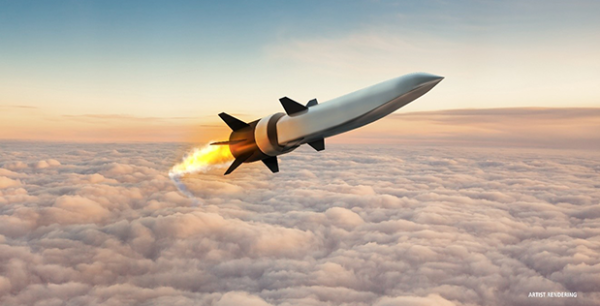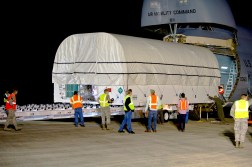The Air Force awarded Lockheed Martin a $1.86 billon contract June 24 to complete production on two new ballistic missile-detecting satellites.
Once launched, the two satellites will be the fifth and sixth Geosynchronous Earth Orbit satellites for the Space Based Infrared System (SBIRS), which continuously monitors for missile launches around the world. Lockheed Martin also built the previous GEO satellites, as well as several other products for the SBIRS.
“SBIRS provides capabilities critical to our nation’s defense but we also understand in today’s environment that we need to find that perfect balance between capability and affordability,” Jeffrey Smith, vice president of Lockheed Martin’s overhead persistent infrared mission area, said in a release. “This contract is the third part of a thoughtful acquisition strategy aimed at further reducing cost and cycle time for GEO-5 and GEO-6, while still providing exceptional data to the warfighter.”
GEO-1 and GEO-2 — both launched on Atlas V rockets — were deemed operational by the Air Force in 2013. The third GEO satellite is being tested in California and is scheduled to be delivered to the Air Force at the end of this year, according to a release from the company. GEO-4 is in the final assembly phase.
The contract builds on two other programs the Air Force awarded Lockheed in 2012 and 2013 for the initial planning process and procurement of materials for the satellite and adds funding for the completion of the project. All together, Lockheed Martin has received more than $2.2 billion from the Air Force for the GEO-5 and GEO-6 satellites.
News of the contract came just days after one of Lockheed’s main rivals in the defense sector, Boeing, successfully completed a missile intercept test over the Pacific Ocean.
Partnering with the U.S. Missile Defense Agency, a Boeing team worked to intercept and destroy a target mid-flight using the Ground-Based Midcourse Defense system. The test used an Exoatmospheric Kill Vehicle, which when attached to an intercept booster, flew on its own in space and hit and destroyed the target, according to a release from Boeing.
Boeing has been the prime contractor for the GMD since 2001.
“The operational complexity of the GMD system is a major engineering challenge, but we have drawn upon our unmatched expertise to work toward today’s successful intercept,” Norm Tew, Boeing’s vice president and GMD program director, said. “This test enables us to continually modernize and improve the system, providing even greater capabilities to protect this country.”





